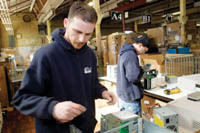
CC Laurel employees Ed Corriveau, left, and Austin Ryfa dissassemble computers so that their individual components can be recycled.
At CC Laurel Industries, one man’s trash can be another man’s liability.
The Cumberland company offers its clients protection from the liabilities associated with the disposal and recycling of electronic waste.
“We manage those processes for our clients to ensure that other people do what they’re supposed to do,” said CC Laurel CEO Thurston J. Hartford. “If they make a mistake, we pay.”
What the management process means is that unlike most companies associated with electronic recycling, there are no large machines grinding up electronics and turning them into raw materials. Instead, CC Laurel separates the materials and removes tags and identifying serial numbers.
CC Laurel then redirects the stripped-down components to companies that can use them.
The company’s Titus Street facility is filled with rows of TV sets, thousands of pieces of computers, and large machines used in the health care industry.
According to Hartford, all of these will be refurbished and redistributed, split up and redirected, or kept by the company and sold on eBay, a portion of CC Laurel’s operations that makes up about 20 percent of its revenue.
“If we can reuse it as a whole unit, we will, of course, exhaust that option first,” Hartford said. “If we can’t, then we start getting into the process of de-manufacturing.”
In some cases, a seemingly worthless product can have value. For instance, the gold pieces of a non-functioning computer pin board can be melted and turned into gold bars.
CC Laurel is also capable of disposing of products in ways that meet clients’ confidentiality needs, Hartford said. With the use of a degausser that had been previously owned by the U.S. Navy, a computer hard drive can be fried and disposed of without fear of breaching privacy.
“We could do business with a defense contractor who has very specific requirements for destruction, and we would be able to meet those [specifications],” Hartford said.
With liabilities for incidents of environmental slip-ups costing companies thousands of dollars, Hartford also offers a way to protect his clients from any type of future problems.
Through a partnership with Green-Tech Assets Inc., a company also owned by Hartford, the goods recycled by the company are managed in such a way that they will have no impact on the environment. The company also provides liability protection against environmental, confidentiality and licensing risks that are associated with the electronic recycling.
To insulate its clients, Green-Tech takes ownership of its clients’ technology assets and provides a waiver of liability.
“If a claim did occur, we have the ability to intercede in that process, settle and pay it with no involvement of the original owner,” said Hartford, adding that Green-Tech is the only company in the United States that offers that kind of protection.
Hartford, who started CC Laurel in 2001 from his Seekonk, Mass. home, said the company plans to open a second facility in California in the near future.
CC Laurel’s clients currently include companies such as Stop & Shop, Benny’s, Radio Shack and various law firms throughout the region.
Hartford also said he is looking to work with municipalities and larger companies to better utilize CC Laurel’s program for collecting technology waste.
Bills are being introduced in the Massachusetts and Rhode Island legislatures aiming to create a cost-free recycling program, Hartford said, and CC Laurel already takes monitors and televisions, PCs and severs, cell phones and printers.
He’s now looking to create drop-off days when employees of a company or residents of a town can just hand over their electronic items to the company, “essentially eliminating” the recycling costs to consumers and municipalities.












